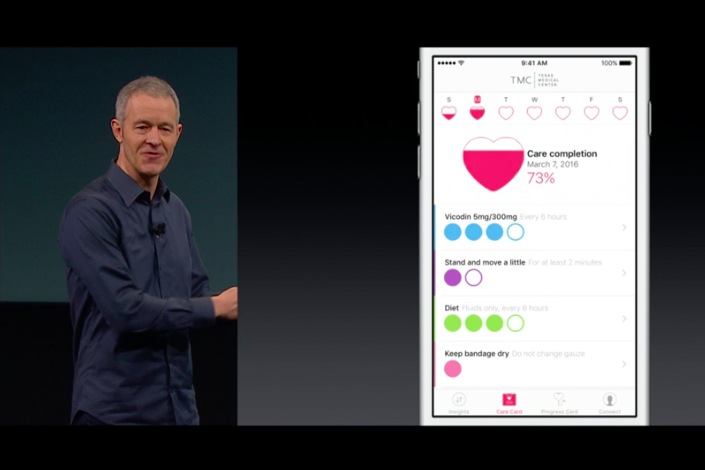
The company used the early part of today’s event to talk about a very important issue to all of us: our health.
ResearchKit
Apple chief operating officer Jeff Williams, took the stage to discuss the progress of ResearchKit. Apple launched ResearchKit last year with the aim of solving one of the biggest problems facing medical research: data collection. Thanks to over a billion Apple devices, however, researchers can now collect the data necessary to further advance medical progress.
For example, researchers have been trying to figure out how to detect autism earlier than the current 5-year-old average. An example app was shown that uses special algorithms to help researchers examine reactions from children, which could lead to an earlier diagnosis for many patients.
ResearchKit can also help researchers better detect when epilepsy patients might suffer seizures. They are using the Apple Watch to save accelerometer and heart rate sensor data during seizures. With the ability to study a larger data set, researchers hope to acquire the ability to alert patients as to when they might be more susceptible to having a seizure, giving them time to get to a safe place.
Related Offer: The Apple Watch – You. At a glance.
CareKit
Willams also introduced a new open-source platform called CareKit, which gives patients the power to manage their own medical conditions and care. The Texas Medical Center already has an app built on CareKit, which assists in post-surgery recovery. Other apps from Sage Bionetworks and the University of Rochester monitor Parkinson’s Disease in patients
There are four modules. Care Cards provides a sort of to-do list that helps patients remember to take medications and perform physical therapy exercises.
The Symptoms and Measurement Tracker allows patients to record their progress. They can take pictures of a wound to show how it’s healing and use the iPhone’s accelerometer and gyroscope to measure a limb’s range of motion.
The Insight Dashboard compares the patient’s symptoms against the Care Cards, and the Connect module allows patients to share data with their doctor(s).
A very cool example application shown at the event involved a Parkinson’s patient who uses an app to record symptoms before and after exercise to find out if working out impacts the progression of the disease. Another feature is that doctors can now detect much faster how a patient is responding to medications so that the dose or type of medication can be changed as needed.
Williams also wanted to make it clear that you choose where CareKit data is shared. Apple will never share any of the data to anyone without authorization.
CareKit will be available this April.


